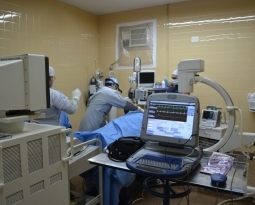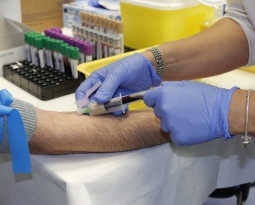Rhode Island Patent of the Month – April 2021
Photodynamic Therapy (PDT) is a treatment using light-sensitive medicine and a light to destroy abnormal cells and is commonly used for certain cancers. When exposed to light, the medicine is converted into a phototoxin which chemically interacts with surrounding molecules and contributes to their degradation. This medicine can be from a family called BA which is benzophenoxazinium or any analog or derivative. While the PDT might not impact each cell in a tumor, prolonged immunogenic response can deteriorate the remaining tumor, potentially resolving the entire tumor. However, this prolonged immunogenic response does not happen every time. In fact, most human tumor types are non-immunogenic and will not experience this prolonged response and are treated only at the initial point of light-exposure. VeroScience, LLC has designed a metabolism altering method that will aid PDT for a more effective treatment.
VeroScience’s method involves increasing the metabolic activity of the non-tumor cells within a tumor mass (e.g. fibroblasts, immunocytes). This can be done through the use of any metabolic substrate like glucose or glutamine. Typically raising the metabolic rate will enhance tumor growth, metastatic potential, and lethality and is therefore avoided. However, with recent research on BA-PDT therapy, it seems that increasing metabolic activity level right before therapy can actually improve treatment efficacy and inhibit tumor growth. Once the metabolic rate surpasses the basal metabolic activity level of the tumor, a BA dye is administered to the tumor which is then exposed to light. Treatment continues, with the BA dye converting to a phototoxin and chemically interacting with the surrounding tumor molecules and now show the prolonged immunogenic response with greater tumor degradation.
Are you developing new technology for an existing application? Did you know your development work could be eligible for the R&D Tax Credit and you can receive up to 14% back on your expenses? Even if your development isn’t successful your work may still qualify for R&D credits (i.e. you don’t need to have a patent to qualify). To find out more, please contact a Swanson Reed R&D Specialist today or check out our free online eligibility test.
Who We Are:
Swanson Reed is one of the U.S.’ largest Specialist R&D tax advisory firms. We manage all facets of the R&D tax credit program, from claim preparation and audit compliance to claim disputes.
Swanson Reed regularly hosts free webinars and provides free IRS CE and CPE credits for CPAs. For more information please visit us at www.swansonreed.com/webinars or contact your usual Swanson Reed representative.

















